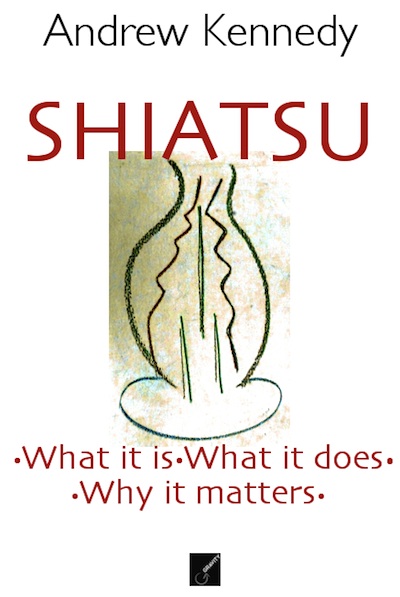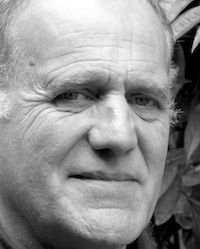

ISBN 9780954483180 Gravity Publishing, UK;
Published:1st
May 2014; trade paper; 152mm x 228mm; 178 pages;
subject: health, CAM therapies; general
readership.
If you are a bookseller please
click here
Buy from this secure site for just 12.49€
packaging + postage (delivery 5 - 10 days)
available for dispatch from 10th May 2014
Buy from this secure site for just 12.49€
packaging + postage (delivery 5 - 10 days)
available for dispatch from 10th May 2014
The book interleaves discussions about the philosophy and history behind shiatsu and its practical application with details of 25 varied stories and case histories taken from the author's practice, and discusses where the therapy's future lies in the wider world of health care.
It is written for those who are curious about the therapy, for students of shiatsu, for practitioners and for psychologists and doctors who want to understand how the therapy is used.
Incuded in the case studies is an appraisal of a historical conundrum - the case of Darwin's Stomach. The author diagnoses what is known about the symptoms that Darwin suffered throughout his life and comes to an orginal conclusion about what may have caused them.
"As an illustration of the kind of analytical process a practitioner may go through, I will diagnose a celebrated case from history, the problem of Darwin's stomach.
Darwin famously suffered from a bad stomach which limited his desire for social engagements. He farted and retched continuously, and is often thought to have contracted some exotic stomach bug on his travels. His mysterious ailment, never pinned down to any specific physical cause, has stimulated a lot of speculation about exotic infections, his delicate constitution, his psychosomatic mental state, his relationship with his father, his relationship with his mother, his relationship with his wife, his struggle with religious orthodoxy and so on.
The key to his suffering, however, may be found in his simple observation made in 1838 ..."
Brian Carling. Director Europe Shiatsu School
"...I was really impressed [by this book]. The mix of case histories and insights and explanations about shiatsu, its practice and its place in relation to conventional medicine was excellent. I loved the way [the book] integrated physical signs and symptoms with psychological traits and how we could follow the changes both physically and emotionally through the case histories.."
Paul Bagot, UK National Health psychologist
"...A contemporary work, it quite rightly looked at both the position and relevance of shiatsu in treatment applications today...the author has reflected on a number of instances where shiatsu may be used effectively... and the examples of trauma work and PTSD, where the work force could benefit from sessions, I found quite thought provoking...I liked the gentle inclusion of the philosophy of the tao and zen throughout the book which never felt overwhelming or inappropriate...the reader is left in no doubt about what shiatsu is and what it does..."
Nuno Fernandes, practitioner
"Of course... I started reading the book last week, and so far (i'm in the middle) it has been a fascinating reading. I come from the Namikoshi system, but i'm slowly incorporating the Masunaga meridian expressions into my practice in recent years. So, your book came as a good addition for learning, and actually it gave me some new insights regarding some of my own clients. Also, i really like the refreshing way you explain what Shiatsu is in its various aspects and dimensions and its daoist connection which find resonance in me. I guess you're a pioneer for writing a book about shiatsu based on case studies. Seriously, i wish more practionners to follow your steps... This is truly a book for the 21th century. It is not about the technique, it is about the heart of shiatsu."
"...At the end of
the hour or so, I will ask you to rest patiently for
a minute or two. When you emerge from the treatment room I may say
nothing. If you ask me what I found, I may tell you exactly or I may
say something more general. If you tell me how you feel, I will listen
and take note. I may recommend exercises or other things to do or not
do. I will tell you to take it easy for the rest of the day and
to be ready to feel changes that may occur within the next day or so. I
observe how you leave, and then I sit to write up my notes.
So is shiatsu massage?
You will agree the experience you have had has not been a massage. The physical sensations you feel and will continue to feel through several days are not what massage give, and the thoughts that may be stimulated in you are not those that usually accompany a massage. A first-time client, for example, who came in for painful neck and shoulders was thoroughly mystified after his session, “The pain has gone, but you never touched my shoulders. What magic is this?” For you, I may not have gone anywhere near the site of the pain and yet you will still feel relief. A massage goes to the site of the pain and works the area.
Touch, pressure, massage?
Shiatsu combines all these things and yet?
Louise, a long time client wrote to me once after a session with a simple message, it is my favourite form of therapy by far. A client came in for a second session and confessed, "I didn't think the first session did anything for me, and yet...here I am."
There is something different about the shiatsu experience. How has that come about?..."
So is shiatsu massage?
You will agree the experience you have had has not been a massage. The physical sensations you feel and will continue to feel through several days are not what massage give, and the thoughts that may be stimulated in you are not those that usually accompany a massage. A first-time client, for example, who came in for painful neck and shoulders was thoroughly mystified after his session, “The pain has gone, but you never touched my shoulders. What magic is this?” For you, I may not have gone anywhere near the site of the pain and yet you will still feel relief. A massage goes to the site of the pain and works the area.
Touch, pressure, massage?
Shiatsu combines all these things and yet?
Louise, a long time client wrote to me once after a session with a simple message, it is my favourite form of therapy by far. A client came in for a second session and confessed, "I didn't think the first session did anything for me, and yet...here I am."
There is something different about the shiatsu experience. How has that come about?..."
Maria: hypochondria and inner cold
I
had completed my case studies and passed the final examination though
not yet received my degree when one of my case studies, who later
became a regular, recommended one of her contacts to me. I had set up
my practice but did not yet have the official document in my hand so I
said I would take on one more client and not charge them a professional
fee until I could hang my qualification on my wall.
Maria arrived. She was 62, divorced with no children, a university professor. She had very pale skin, was dressed in all white and spoke with a very strong voice. Her face was balanced, the features smooth, eyes with a black iris and with a challenging stare that dared me to surprise her.
If she wanted to intimidate me, she did a good a job. She sat down and produced a portfolio of her medical history. Every doctor's report neatly typed up for me. All the occasions where she had reported a symptom or a worry to a doctor were tabulated by date and diagnosis. Another file held x-rays going back years. I scanned the pages politely and put them aside, but not before my eye caught sight of the words 'rabies test' and 'alleged bat bite' on one of the pages..."
Maria arrived. She was 62, divorced with no children, a university professor. She had very pale skin, was dressed in all white and spoke with a very strong voice. Her face was balanced, the features smooth, eyes with a black iris and with a challenging stare that dared me to surprise her.
If she wanted to intimidate me, she did a good a job. She sat down and produced a portfolio of her medical history. Every doctor's report neatly typed up for me. All the occasions where she had reported a symptom or a worry to a doctor were tabulated by date and diagnosis. Another file held x-rays going back years. I scanned the pages politely and put them aside, but not before my eye caught sight of the words 'rabies test' and 'alleged bat bite' on one of the pages..."
"...So shiatsu resets, re-establishes, re-invigorates our connections to the rest of the universe. The Dao is indifferent to each of us as an individual but the rest of the material world is not, because we are a point of connection in it and play a role, however unconscious, in letting the Dao pass purely through us and on to connect with someone or something else.
Why this matters is that the Dao is the origin of health, and letting it play out as purely as possible is the healing connection. This is why ill-health does not occur simply within you, there is a sense in which everything around you is also involved. Yes, the effects of shiatsu can be traced in the actions of the sympathetic and parasympathetic nervous systems, in the actions of the brain on the muscles, in the flow of blood to tissues and the levels of hormones in them, but there is also a larger truth about the universe we find ourselves in that shiatsu addresses..."

Andrew
Kennedy, was born in the UK and studied science at Edinburgh
University. Among diverse activities he has farmed, designed games and
patented a switching device. He writes fiction and non-fiction, with
interests ranging from rural Basque society to cosmology and space
travel.
He published The Jade Suit in 2003, an epic poem and meditation on Daoism and Chinese history, and in 2006 produced Briefing Leaders with a new analysis of I Ching and an original way of presenting Dao De Ching.
In 2009 he published Essential Personalities, and why humans found love, adapted to monogamy and became better parents, which presented an entirely new way of considering the Darwinian evolution of astrological-type personalities.
A qualified Shiatsu therapist, he published a book on the philosophy and clinical pratice of shiatsu, Shiatsu: What it is •What it does•Why it matters, in 2014.
As a Fellow of the British Interplanetary Society he writes about interplanetary travel and the prospects for Humans as they attempt to cross the development threshold as a space-going civilisation.
He published The Jade Suit in 2003, an epic poem and meditation on Daoism and Chinese history, and in 2006 produced Briefing Leaders with a new analysis of I Ching and an original way of presenting Dao De Ching.
In 2009 he published Essential Personalities, and why humans found love, adapted to monogamy and became better parents, which presented an entirely new way of considering the Darwinian evolution of astrological-type personalities.
A qualified Shiatsu therapist, he published a book on the philosophy and clinical pratice of shiatsu, Shiatsu: What it is •What it does•Why it matters, in 2014.
As a Fellow of the British Interplanetary Society he writes about interplanetary travel and the prospects for Humans as they attempt to cross the development threshold as a space-going civilisation.
©2020
The Cosmology of People
